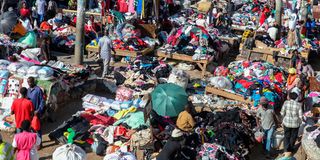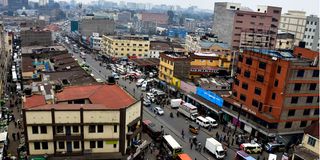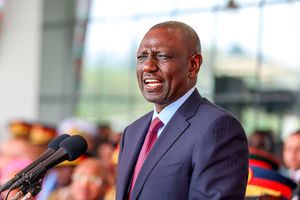
Whether it’s selling clothes, phones accessories, shoes, working in barber shops and salons or fresh produce, their presence is hard to miss.
On the bustling streets of many Kenyan towns, a quiet shift has happened in the last few years.
From Nairobi’s downtown alleys to Kisumu’s busy markets and Nakuru’s town centre, Burundians, Congolese and Rwandese have cemented themselves as dominant players in the informal trade.
Whether it’s selling clothes, phones accessories, shoes, working in barber shops and salons or fresh produce, their presence is hard to miss.
In smaller towns, when local traders close shop by evening, foreign traders are willing to push their hustle deep into the night, ensuring they capture every potential customer.
In Nairobi, they're in places like Gikomba, Eastleigh, Kasarani and Muthurwa, selling anything from second-hand clothes to household goods.
In Kisumu, they’ve found a foothold in many parts of the lakeside city while in Bomet and Nakuru, their ability to work long hours has made them formidable competitors in the hawking business.
In Kitengela, the Congolese community is so close-knit that locals call the area where they live in the dusty suburbs 'Little Kinshasa'. It doesn't matter that most Kinyarwanda speakers live in the eastern Democratic Republic of Congo, thousands of kilometres from Kinshasa.
But not everyone is happy with this shift.
Some Kenyan hawkers lament that they are being pushed out of business by foreigners willing to accept razor-thin profit margins.
County authorities too have found themselves grappling with a growing number of undocumented traders, raising concerns over regulation and taxation.
Yet, despite the occasional crackdowns, migrant hawkers keep bouncing back and adapting to the ever-changing street economy.
Why Kenya is attractive

An aerial view of downtown Nairobi CBD.
Kenya’s relatively stable economy, porous borders and relaxed entry policies have made it a magnet for illegal immigrants seeking economic opportunities.
Nairobi, in particular, has become a major transit point for undocumented migrants fleeing conflict and economic hardship in their home countries.
Many undocumented foreigners particularly from East and Central Africa have taken up jobs traditionally reserved for locals with the majority engaging in hawking foodstuffs, textiles, and mobile phone accessories.
Beyond urban centres, they are also in residential areas, bus stations and even rural homes.
Data from the Immigration Department shows that between 2023 and 2024, 1,455 undocumented immigrants were arrested which is a rise from 1,219 the previous year.
Many have been deported but some find their way back, raising concerns about the effectiveness of border security.
On February 16 this year, 18 Burundian nationals were intercepted in Bomet while en route to Nairobi. Authorities believe they were heading to link up with agents before being absorbed into the growing community of illegal immigrants in Kenya.
Police said their vehicle, a minibus, was flagged at a roadblock on the Bomet-Kaplong highway.
The 16 adults and two children were arraigned in a Bomet court on Tuesday where they pleaded guilty to being in Kenya unlawfully.

A section of 18 Burundians at the Bomet Chief Magistrate's court on February 25, 2025, where they pleaded guilty to charges of being in Kenya illegally.
They were detained for a week as the court sought intervention from the Burundian embassy in Nairobi for an interpreter as they did not understand Kiswahili or English.
As they hurdled in court on Tuesday, an interpreter from the embassy was allowed to translate court directives to them, before they were led to the cells where they would be held for another week. Eventually, Chief Magistrate Esther Boke ordered their repatriation to Burundi.
In their words
But despite the risks of getting caught, some feel it is worth it.
Nation.Africa spoke to some of the foreigners who are working informally, and illegally, in a bid to understand the migration shift. In their words.
Peter*, a Congolese hawker in Bomet, says he has lived in Kenya for three years and has no plans of leaving.
“For many of us from Congo, Kenya is paradise like America. It's a land of opportunity with welcoming communities and we rarely get asked for documentation,” he said.
But like fellow hawkers who aren't Kenyan, Peter declined to reveal how he managed to own a registered mobile number. On pressing further, Nation.Africa found that the line is registered in the name of a Kenyan woman, as revealed by his M-Pesa transactions.
A number of foreign traders this writer spoke to use Kenyan-registered SIM cards, raising concerns about how they obtain them despite strict mobile registration policies.
Investigators involved in the arrest of the Burundians in Bomet disclosed that each migrant had paid an agent Sh13,000.
“They said this is after having sold property in Burundi with promises of jobs and permanent residence in Kenya. Some have spouses already residing in the country,” the police source indicated.
Ruto's immigration policies - the good and the bad
President William Ruto’s vision of visa-free entry policy for Kenya was celebrated when he announced it in 2023. The goal is to open up Kenya to the world, with the effect of the landmark move meaning it will no longer be necessary for any person from any corner of the world to apply for a visa to enter Kenya.
To implement the new policy, he said the government has developed a digital platform to ensure that all travelers to Kenya are identified and screened days in advance on an electronic platform.
“It shall no longer be necessary for any person from any corner of the globe to carry the burden of applying for a visa to come to Kenya. To echo the call of the Turkana people to the world: “Tobong’u Lorre!” Kenya has a simple message to humanity: Welcome Home!” he said at the time.
Under the new system, Africans only need to register online three days before travel.
For members of the East African Community (EAC) — Tanzanians, Rwandans, Burundians, Ethiopians, and Ugandans — they can stay for six months.
While the net effect of the policy is an uptick in the number of visitors, critics of the policy have raised security concerns.
For instance, Kipipiri MP Wanjiku Muhia reckons the more relaxed immigration rules bear some risks for Kenya.
“The government must be cautious. Opening our borders without stringent checks is a security risk,” she warned.
She also criticised the relaxed vetting for ID issuance in Northern Kenya, warning that it could lead to Al-Shabaab operatives obtaining Kenyan citizenship.
Separately, former Bomet Mayor Kipkemoi Barsumei opines that its ironic that while Kenya is working hard to secure jobs for its citizens abroad, foreigners are freely encouraged to come in and do business.
“It’s disturbing to see foreigners openly hawking in Kenya while our own struggle to find employment. Even Chinese nationals are now roasting maize and engaging in retail trade,” Mr Barsumei said.
He warned that unless policies are revised, foreign traders could soon dominate the informal sector, which could foment discontent among locals and become a bigger problem down the line.
Human trafficking
But Kenya isn't just a destination but also a transit route for illegal migrants, particularly Ethiopians, attempting to reach Europe and south Africa.
Several have been arrested while in transit to Nairobi, with authorities suspecting a human trafficking syndicate operating through Tanzania.
Globally, human trafficking networks have taken advantage of unstable regions, smuggling thousands into Europe, often through dangerous sea routes. Many have perished in the Mediterranean, creating a humanitarian crisis.






